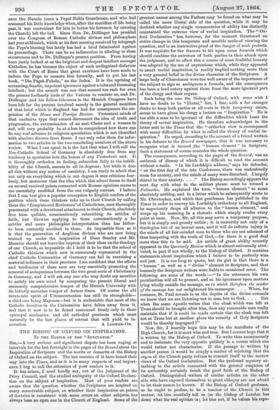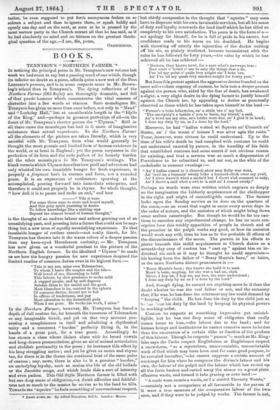THE BISHOP OF OXFORD ON INSPIRATION. To THE EDITOR OF
THE "SPECTATOR."
SIR,—A very curious and significant dispute has been raging at intervals for the last fortnight in the pages of the Record about the Inspiration of Scripture and the merits or demerits of the Bishop of Oxford on the subject. The Last remains of it have found their way into the Times, and as it is in many respects of real import- ance I beg to call the attention of your readers to it.
It has arisen, I need hardly say, out of the judgment of the Privy Council, and the studied ambiguity of the Oxford Declara- tion on the subject of inspiration. Most of your readers are aware that the question whether the scriptures are inspired on every conceivable subject, or whether their inspiration on points of doctrine is consistent with some errors on other subjects, has always been an open one in the Church of England. some of the
greatest names among the Fathers may be found on what may be called the more liberal side of the question, while it may be doubted whether any single commentator of ability has distinctly maintained the extreme view of verbal inspiration. The " Ox- ford Declaration" has, however, for the moment threatened an entire change in this temperate and sensible mode of viewing the question, and is an instructive proof of the danger of such protests. It was requisite for the framers to hit upon some formula which should combine the extremes of both parties in their attack upon the judgment, and to affect this a course of most doubtful honesty was adopted by the use of expressions which, while they appeared to assert verbal inspiration, in reality implied nothing more than a very general belief in the divine character of the Scriptures. A large body of Churchmen were too well aware of the importance of the subject to sign so ambiguous a formula, and the consequence has been a loud outcry against them from the more ignorant part of the clergy and their organs.
Such being the case the Bishop of Oxford, with some wish I have no doubt to be "liberal," but, I fear, with a far stronger desire to keep both parties at all costs in their temporary union, seems to have given his clergy a lecture on "Inspiration." He is too able a man to be ignorant of the difficulties which beset the theory of verbal inspiration. He therefore acknowledges in the letter sent to the Times that the "orthodox view is encompassed with many difficulties by what is called the theory of verbal in- spiration." He urged, according to the account of a friend written in his defence to the Record newspaper, that it was necessary to recognize what is termed .the "human element" in Scripture. Such a statement of coarse concedes the whole question.
The consequence, according to the pages of the Record, was an outbreak of dismay of which it is difficult to read the account without a smile. "In his Lordship's address," says his defender, "on the first day of the late Conference, there Ve as undoubtedly room for anxiety, and the minds of many were disturbed. I largely shared in their anxiety. . . ." The Bishop accordingly appears the next day with what in the mildest phrase must be termed a Palinodia. He explained the term "human element" to mean absolutely nothing, and in a letter which he subsequently wrote to Mr. Christopher, and which that gentleman has published in the Times in order to convey his Lordship's orthodoxy to all England, he sagaciously drops all allusion to the "human element," and wraps up his meaning in a rhetoric which simply evades every point at issue. Now, Sir, all this may serve a temporary purpose, but it is simply and grossly unfair ; it is unworthy not only of a theologian but of an honest man, and it will do infinite injury in the minds of all fair-minded men to those who are not ashamed of thus tampering with the truth of God,—for there is a good deal more than this to be said. An article of great ability recently appeared in the Quarterly Review which is almost universally attri- buted, in part if not wholly, to the Bishop of Oxford. It contains statements about inspiration which I believe to be perfectly wise and just. It is too long to quote, but its gist is that there is a " human " as well as a " divine " element in Scripture, and that humanly the Scripture writers were liable to occasional error. The following are some of the words :—" In the utterance his own peculiarities will all be present, and so his ignorance upon matters lying wholly outside the message, as to which therefore the sender of the message has not enlightened his messenger. . . . When, for instance, St. Paul reveals to us the depths of the divine counsels we know that we are listening not to man but to God. . . . But when the same Apostle writes that the cloak which was left at Troas should be brought after him, does any reasonable man really maintain that if it could be made certain that the cloak was left not at Troas but at another place the veracity of Holy Scripture would be thereby impugned ?"
Now, Sir, I heartily hope this may be the manifesto of the High Church, for it is most wise and true. But I cannot hope that it is written by the Bishop of Oxford. To write thus anonymously and to insinuate the very opposite publicly is a course which one would rather not characterize. If the passage is written by another person it would be simply a matter of rejoicing that the organ of the Church party refuses to commit itself to the narrow views of the Oxford Declaration. But the profound mystery at- taching to the article connected with the general suspicion of its authorship certainly touch the good faith of the Bishop of Oxford. Distinguished writers of similar articles on the other side who have exposed themselves to great obloquy are not afraid to let their names be known. If the Bishop of Oxford professes, as he ought to profess, to be a teacher of the Church in this matter, let him manfully tell us (as the Bishop of London has done) what his real opinion is ; let him not, if he values his repu-
tation, be even supposed to put forth anonymous feelers on so solemn a subject and then to ignore them, or speak boldly and openly one day and on the next, as soon as he is pressed by the most narrow party in the Church retract all that he has said, as if he had absolutely no mind and no fairness on the greatest theolo- gical question of the age. —I am, Sir, yours,































 Previous page
Previous page